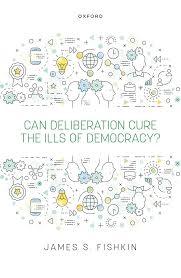
https://deliberation.stanford.edu/news/deliberative-polls-citizens-conve...
PROGRAMME
I. Discussion of the book Can Deliberation Cure the Ills of Democracy ? (OUP, 2025)
- James Fishkin’s presentation.
- Discussant: Bernard Reber(CNRS-Cevipof)
II. Comparison between the two experiments French Citizens’ Convention for the Climate and America in One Room (Climat and Energie), based on the book Démocratie délibérative et transition écologique - La Convention citoyenne pour le climat and the project: Climate Conversations.
- Dimitri Courant (Harvard University)
- Estelle Ciesla (Stanford University)
III. Pure or panel based sortition?
Round table:
- Gil Delannoi (Cevipof)
- Bruno Cautres (CNRS-Cevipof)
- James Fishkin (Stanford University)
Event co-sponsored by:
France-Stanford Center For Interdisciplinary Studies. Global Studies
Journal of Sortition
AIRE, Sciences Po
LIED, University Paris Cité
ABOUT
In our modern world of propaganda, social media enclaves, misinformation, and manipulation, the connection between “the will of the people” and political action has broken down, political divisions are becoming increasingly intractable, and democracies are growing ever more ungovernable.
Democracy is in crisis. James Fishkin, Prof. in Stanford University will argue that deliberative democracy can have surprisingly positive effects on all of these problems and charts a unique path to fixing them with his method of Deliberative Polling. After decades of applying and perfecting the methods of deliberative democracy in countries all over the world, this book synthesizes the results of 150 applications and shows how the method can be applied to resolve many of democracy’s seemingly intractable challenges.
Furthermore we will compare one of these Deliberative Polls (America in One Room:Climate and Energy: focused on climate issues with the famous French Citizens’ Convention for the Climate and the recent dense extensive and voluminous publication of the interdisciplinary analysts of this citizens assembly. We will focus on the much-discussed problem of the random selection for these experiments. Indeed, the representativeness of the composition is an essential element for their legitimacy. It is also necessary to be able to position oneself between proximity to a more interactive form of polling and greater responsibilities given to the participants selected at random. The latter then venture more deeply into deliberative processes.









